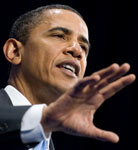 AFP: President Barack Obama gave the go-ahead for robust sanctions against Iran’s energy sector Friday, judging there is enough oil on world markets to ensure the move will not hammer US consumers. By Andrew Beatty
AFP: President Barack Obama gave the go-ahead for robust sanctions against Iran’s energy sector Friday, judging there is enough oil on world markets to ensure the move will not hammer US consumers. By Andrew Beatty
 WASHINGTON (AFP)— President Barack Obama gave the go-ahead for robust sanctions against Iran’s energy sector Friday, judging there is enough oil on world markets to ensure the move will not hammer US consumers.
WASHINGTON (AFP)— President Barack Obama gave the go-ahead for robust sanctions against Iran’s energy sector Friday, judging there is enough oil on world markets to ensure the move will not hammer US consumers.
With just hours to go before a deadline to decide, Obama determined the United States could punish banks and other financial institutions for buying oil from Iran, without causing a global oil shock.
The step could have major implications for Tehran and its customers, forcing firms and countries to choose between trade with the United States and Iranian oil.
China, South Korea, India, Japan and the European Union are major buyers of crude from Tehran.
The measures call on countries to “significantly reduce” oil imports from Iran — although not stop them all together — or face being frozen out of the US financial system.
Many countries have spent months scrambling to reduce dependence on Iranian oil before the sanctions go into effect in June.
Senior US officials said Japan and the European Union had done enough to dodge sanctions, but exemptions for India, South Korea, China and nine other nations were still being weighed.
“We have been very transparent with countries around the world about the steps they can take to pursue that type of exception,” one official said.
Japan earlier vowed to reduce its Iran oil imports “considerably,” while the EU is set to introduce its own partial embargo on Iranian oil this summer.
Shortly before Obama’s announcement, Turkey’s national oil company Tupras said it had cut purchases of Iranian oil by 20 percent.
But China has yet to show its hand publicly and India, despite friendly relations with the United States, has so far defied pressure to shut off oil from Iran.
The sanctions are part of a broad effort by Western governments to push Iran toward mothballing controversial bits of its nuclear program, to stop support for proscribed groups and to end human rights abuses.
If Iran is unable to find other buyers, the sanctions could hit the country where it hurts.
Oil and gas revenues form the backbone of Iran’s economy and have proven vital to the survival of a regime that has been in power since the 1979 Islamic revolution.
The energy industry accounts for 70 percent of government revenues.
Washington and Brussels believe the sanctions are beginning to take a toll on the Iranian economy, reducing revenues, pushing down the value of Iran’s currency and making imports more costly.
Last month, Tehran agreed to revive talks on its nuclear program that had been abandoned in January 2011, although no date has been set for new meetings.
But the sanctions also carry a risk for Obama.
With a little over seven months to go before presidential elections, Obama is under intense pressure at home over rising gas prices, which the move could aggravate.
Prices at the pump have risen around nine percent in the last year, hitting car-loving Americans when they can least afford it.
Any further rise would put Obama’s reelection bid in grave jeopardy.
In a statement, Obama insisted there was enough give in the system to make up for the loss of Iranian production, although White House officials were quick to dispel the notion that they could definitively control prices.
“There is a sufficient supply of petroleum and petroleum products from countries other than Iran to permit a significant reduction in the volume of petroleum and petroleum products purchased from Iran by or through foreign financial institutions,” the president said.
“I will closely monitor this situation to assure that the market can continue to accommodate a reduction in purchases of petroleum and petroleum products from Iran.”
The International Energy Agency estimates that exports from Iran could plunge by about 800,000 barrels per day to one million barrels per day in the second half of the year after the tighter Western sanctions go into force.
Oil prices in New York rose slightly on the news, before falling back.
The prospect of more tensions between Iran and the West has caused rumbling in oil markets for weeks, but some traders took solace from Obama’s assessment.
The sanctions will go into effect on June 28.
Obama had to make a decision on the sanctions 90 days before their entry into force and will reassess the move periodically.


